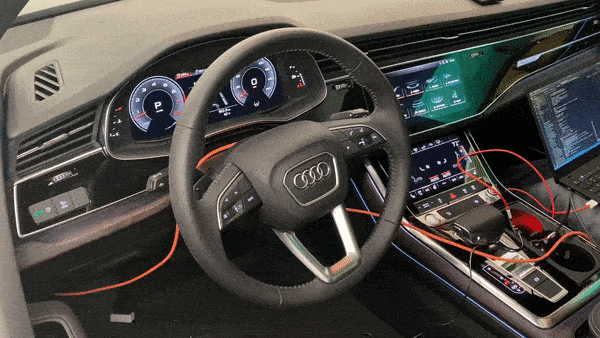“As innovators in fleet vehicle design and engineering, Utilimaster translates customer feedback alongside emerging transportation, infrastructure, and technological trends into innovative designs,” said Daryl Adams, President and Chief Executive Officer, Spartan Motors. “Our commitment to bringing these industry-leading products to market faster and more efficiently means we’re best positioned to meet the needs of our… Continue reading Utilimaster Unveils New Velocity M3 Walk-in Cargo Van at the 2020 Work Truck Show
Tag: Daimler
Car maker: Daimler board member Harald Wilhelm cleans up in the finance department
Harald Wilhelm Munich Before moving to Daimler hurried in April 2019 CFO Harald Wilhelm the call of a cleaner is already ahead. Finally, the 53-year-old stopped as CFO of airbus dubious payments; In the affair about the use of middlemen in the sale of jets, he once made a voluntary declaration to the corruption agency… Continue reading Car maker: Daimler board member Harald Wilhelm cleans up in the finance department
@Daimler: 04. Mar 2020Management changes at Investor Relations and Daimler Greater China
March 04, 2020 – Daimler has appointed Steffen Hoffmann and Olaf Schick for two top positions in the finance department. After 11 years at the helm of Daimler AG’s Investor Relations department, Björn Scheib will hand over responsibility to his successor Steffen Hoffmann on April 1, 2020. Scheib has decided to continue his professional development… Continue reading @Daimler: 04. Mar 2020Management changes at Investor Relations and Daimler Greater China
@Daimler: Mercedes-Benz Motorsport: Sustainability: Mercedes-Benz Accelerates Sustainable Change in Motorsport
Mercedes-Benz announces sustainable business strategy for its motorsport activities and drives the change within Formula 1 for more sustainable racing Mercedes-Benz brings its bold sustainable business strategy to motorsport and advocates for ambitious steps towards carbon neutrality Mercedes-AMG Petronas F1 Team to achieve net-zero carbon footprint by the end of 2020 Mercedes-Benz uses Formula 1… Continue reading @Daimler: Mercedes-Benz Motorsport: Sustainability: Mercedes-Benz Accelerates Sustainable Change in Motorsport
Hacking an Audi: performing a man-in-the-middle attack on FlexRay
Introduction Last weekend comma.ai held a 48 hours hackathon at their San Diego office. We’ve seen some really cool projects, and hopefully the results will be upstreamed to openpilot soon. This medium post is about a project by three comma employees. The goal was to inject steering commands onto the FlexRay bus of an Audi… Continue reading Hacking an Audi: performing a man-in-the-middle attack on FlexRay
Goodyear’s smart tire concept ‘prints’ its own treads
Sponsored Links Goodyear Tires The thunk-whumma-whumpa-whuppa sound of a tire puncturing and losing pressure at freeway speeds is unmistakable. However, if Goodyear has its way humanity might not have to endure the filthy, sweaty, swear-inducing process of swapping rubber on the shoulder of American roads ever again. The Geneva Auto Show has been canceled, but… Continue reading Goodyear’s smart tire concept ‘prints’ its own treads
Renault’s Alpine goes further upmarket as it looks beyond France
PARIS, March 3 (Reuters) – Renault's Alpine brand will launch a more luxurious version of its sleek A110 sports car as it looks to branch out from its core French market and consolidate a jump in sales last year, its chief executive said.
The Renault group, which also makes budget Dacia cars, revived the Alpine brand and its two-seater models in 2017, updating a classic design which hit a peak in the 1960s and 70s.
But the French company is struggling with slumping demand in emerging markets and outlined cost cuts in February to try to turn around a decline in operating margins.
Pricier models like the Alpine could help improve the group's profitability and growth in the longer run as the brand goes even more upmarket and plans more launches, Alpine Chief Executive Patrick Marinoff told Reuters.
“If you look at profit potential in the future, Alpine is the tool and the weapon for Groupe Renault to harvest that potential,” he said in a telephone interview to replace an event p..
Daimler CEO says ‘no issues’ with supplies of electric vehicle battery cells
FILE PHOTO: Ola Kaellenius, CEO of German luxury car manufacturer Daimler AG, speaks at the annual results news conference in Stuttgart, Germany, February 11, 2020. REUTERS/Andreas Gebert (Reuters) – Daimler AG Chief Executive Ola Kaellenius said Tuesday the automaker has ‘no issues’ securing electric vehicle battery cells, and is ramping up battery production to meet… Continue reading Daimler CEO says ‘no issues’ with supplies of electric vehicle battery cells
Martinrea International Inc. Completes Purchase of Structural Components for Passenger Cars Division of Metalsa S.A. de C.V.
TORONTO, March 02, 2020 (GLOBE NEWSWIRE) — Martinrea International Inc., a diversified and global automotive supplier engaged in the design, development and manufacturing of highly engineered, value-added Lightweight Structures and Propulsion Systems, today announced it has completed the acquisition of the Structural Components for Passenger Cars operations of Metalsa S.A. de C.V. The purchase price… Continue reading Martinrea International Inc. Completes Purchase of Structural Components for Passenger Cars Division of Metalsa S.A. de C.V.
Daimler says cost cut plans may see entire platforms eliminated
Mercedes logo is seen as Ola Kaellenius, CEO of German luxury car manufacturer Daimler AG, speaks at the annual results news conference in Stuttgart, Germany, February 11, 2020. REUTERS/Andreas Gebert FRANKFURT (Reuters) – Mercedes-Benz is embarking on a sweeping cost cutting plan to free up cash to build electric and self-driving cars, a step which… Continue reading Daimler says cost cut plans may see entire platforms eliminated

